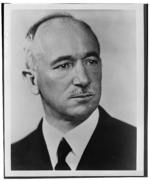Edvard Beneš
| Surname | Beneš |
| Given Name | Edvard |
| Born | 28 May 1884 |
| Died | 3 Sep 1948 |
| Country | Czechoslovakia |
| Category | Government |
| Gender | Male |
Contributor: C. Peter Chen
ww2dbaseEdvard Beneš was born in Kožlany, Bohemia, at the time a province of Austria-Hungary. In 1912, he taught at the Charles University of Prague, and from 1916 to 1918 he was a Secretary of the Czechoslovak National Council in Paris and Minister of the Interior and of Foreign Affairs of the province. His political ideal saw the Czechs and Slovaks working together for a common Czechoslovakia, and with this vision he was a strong organizer of Czechoslovakians abroad. Between 1918 and 1935, he was the Foreign Minister of Czechoslovakia, and from 1920 to 1925 and again from 1929 to 1935 he was a member of the Parliament. Between 1935 and 1938, he was the President of Czechoslovakia, but resigned from office on 5 Oct 1938 as his personal protest against German aggression and western appeasement. Emigrating to Britain, immediately outside of London, he headed the Czechoslovakian government-in-exile as president. In Britain, he organized various movements against German occupation of his home country, one of which culminated in the assassination of Reinhard Heydrich. After the war ended, he returned to Czechoslovakia and resumed his role as the president of the nation, with a new policy to eventually deport ethnic Germans to Germany and Austria. On 7 Jun 1948, he resigned once again, this time due to the communist takeover several months before; Prime Minister Klement Gottwald, the head of the communist movement, succeeded him as the next president. Beneš died at his villa in Sezimovo Ústí, Czechoslovakia.
ww2dbaseSource: Wikipedia.
Last Major Revision: Apr 2006
Photographs
 |  |
Edvard Beneš Timeline
| 28 May 1884 | Edvard Beneš was born. |
| 18 Dec 1935 | Edvard Beneš was elected as the President of Czechoslovakia. |
| 20 Sep 1938 | At 1030 hours, Czechoslovakian military mobilized. At 1700 hours, Czechoslovakian President Edvard Beneš rejected the British-French suggestion for Czechoslovakia to cede Sudetenland to Germany; going further, Beneš asked the French whether France would honor the alliance in the case of a German invasion. |
| 5 Oct 1938 | Edvard Beneš stepped down as the President of Czechoslovakia. |
| 21 Jul 1940 | Edvard Beneš established the Czechoslovakian government-in-exile in London, England, United Kingdom. |
| 16 May 1945 | Exiled Czechoslovakian President Eduard Beneš returned to Prague, Czechoslovakia to a rapturous welcome. |
| 3 Sep 1948 | Edvard Beneš passed away. |
Did you enjoy this article or find this article helpful? If so, please consider supporting us on Patreon. Even $1 per month will go a long way! Thank you. Share this article with your friends: Stay updated with WW2DB: |
Visitor Submitted Comments
7 Oct 2014 09:39:21 AM
As 'Heiro" says above, deport is a euphemism for what was one in fact a calcuted dispossesssion of an entire people, the Sudeten Germans, of everything. Their land, their farms, their homes, their businesses and shops and factories. And, for many of them, even their lives. Tens of thousands of Sudeten Germans died in what they called and still call die Vertreibung. Many of them murdered in ways reminiscent of the Nazis brutalites. The truth is available for anyone who cares to look. Begin with this: http://www.wintersonnenwende.com/scriptorium/english/archives/whitebook/desg00.html
All visitor submitted comments are opinions of those making the submissions and do not reflect views of WW2DB.
» Munich Conference and the Annexation of Sudetenland
Related Books:
» Prague Winter: A Personal Story of Remembrance and War, 1937-1948
- » 1,150 biographies
- » 337 events
- » 44,024 timeline entries
- » 1,241 ships
- » 350 aircraft models
- » 207 vehicle models
- » 375 weapon models
- » 123 historical documents
- » 260 facilities
- » 470 book reviews
- » 28,582 photos
- » 432 maps
James Forrestal, Secretary of the Navy, 23 Feb 1945
Please consider supporting us on Patreon. Even $1 a month will go a long way. Thank you!
Or, please support us by purchasing some WW2DB merchandise at TeeSpring, Thank you!
28 Apr 2010 11:45:14 AM
"Deport" is a euphemism for the expulsion of 3 million Sudeten Germans after 1945. Benes had wanted to get rid of this large minority (1/3 of the whole population) long before. After about 800 years in German Bohemia mostly old people and children were driven away. It was and is a violation of human and peoples`rights.The Benes Decrees are still valid in the Czech Republic, although the EU had hoped they would be abolished, as they don not fit into the European democratic value system